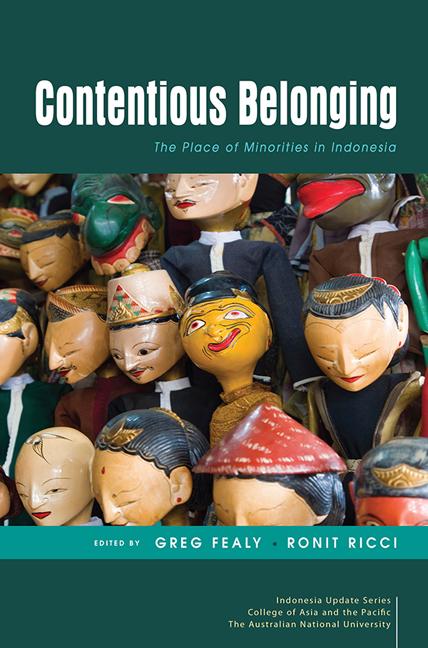Book contents
- Frontmatter
- Contents
- Tables and figures
- Contributors
- Acknowledgments
- Glossary
- Map
- 1 Diversity and its Discontents: an Overview of Minority–Majority Relations in Indonesia
- PART 1 HISTORY AND LAW
- PART 2 DISABILITY
- PART 3 SEXUALITY
- PART 4 RELIGION AND ETHNICITY
- 9 The Mobilisation of Intolerance and its Trajectories: Indonesian Muslims Views of Religious Minorities and Ethnic Chinese
- 10 Disputes Over Places of Worship in Indonesia: Evaluating the Role of the Interreligious Harmony Forum
- 11 Anti-Chinese Sentiment and the ‘Return’ of the Pribumi Discourse
- 12 Minority and Advantage: the Story of Sindhis in Indonesia
- 13 ‘Normalising’ the Orang Rimba: Between Mainstreaming, Marginalising and Respecting Indigenous Culture
- PART 5 REFLECTIONS
- Index
- Indonesia Update Series
13 - ‘Normalising’ the Orang Rimba: Between Mainstreaming, Marginalising and Respecting Indigenous Culture
from PART 4 - RELIGION AND ETHNICITY
Published online by Cambridge University Press: 06 September 2019
- Frontmatter
- Contents
- Tables and figures
- Contributors
- Acknowledgments
- Glossary
- Map
- 1 Diversity and its Discontents: an Overview of Minority–Majority Relations in Indonesia
- PART 1 HISTORY AND LAW
- PART 2 DISABILITY
- PART 3 SEXUALITY
- PART 4 RELIGION AND ETHNICITY
- 9 The Mobilisation of Intolerance and its Trajectories: Indonesian Muslims Views of Religious Minorities and Ethnic Chinese
- 10 Disputes Over Places of Worship in Indonesia: Evaluating the Role of the Interreligious Harmony Forum
- 11 Anti-Chinese Sentiment and the ‘Return’ of the Pribumi Discourse
- 12 Minority and Advantage: the Story of Sindhis in Indonesia
- 13 ‘Normalising’ the Orang Rimba: Between Mainstreaming, Marginalising and Respecting Indigenous Culture
- PART 5 REFLECTIONS
- Index
- Indonesia Update Series
Summary
The Orang Rimba (literally, ‘People of the Jungle’) are one of many indigenous communities in Indonesia. They are described as ‘indigenous’ (asli) not so much in the international sense of being the ‘original inhabitants’ or ‘first peoples’ of a particular region whose presence predates that of the main or subsequently dominant communities, but rather because they are isolated from, or peripheral to, mainstream Indonesian society. The Orang Rimba live predominantly in heavily forested and remote parts of Jambi province, Sumatra, where they have carefully guarded their distinctive traditional beliefs and way of life and deliberately limited their contact with the surrounding society and the state.
Over the past few decades, the Orang Rimba have come under increasing pressure from the national government and local governments, as well as from outside civil society groups, to integrate into Jambi society. This has included efforts to convert them to one of Indonesia's six staterecognised religions, especially Islam, to change the way they dress and to persuade them to allow access to state health and education services as well as housing and agricultural projects. State schooling is particularly controversial, with some fearing that it will detach Orang Rimba students from their traditional systems of knowledge and land use and create identity conflicts. Moreover, changes to the state's management of national parks and conservation zones have impacted heavily on the mobility and lifestyles of the Orang Rimba.
The place of, and policies towards, the Orang Rimba and other indigenous communities raises important and difficult issues for government and broader society. Indonesia prides itself on having an ethos of ‘Unity in Diversity’ (Bhinneka Tunggal Ika) and on valuing and accommodating the immense cultural differences that exist across the archipelago. But indigenous communities test the limits of this putative embracing of diversity more severely than most of the other minorities discussed in this volume, such as the Chinese, Indians and Arabs. There are two reasons for this. First, the Orang Rimba do not seek to be part of mainstream society, and self-consciously assert their separateness. In this sense, their sense of ‘belonging’ to Indonesia is markedly different from that of most other minorities.
- Type
- Chapter
- Information
- Contentious BelongingThe Place of Minorities in Indonesia, pp. 232 - 252Publisher: ISEAS–Yusof Ishak InstitutePrint publication year: 2019



